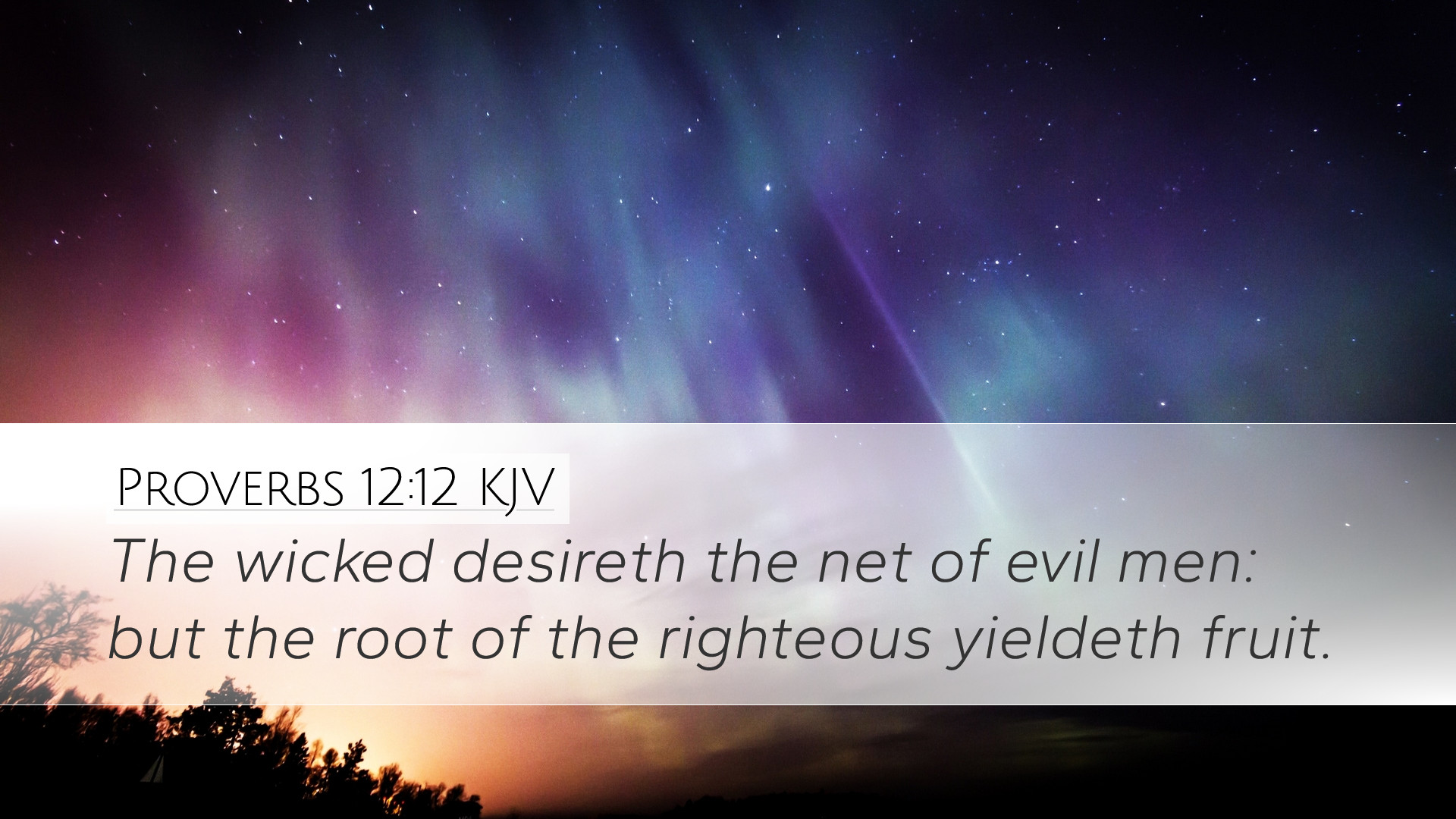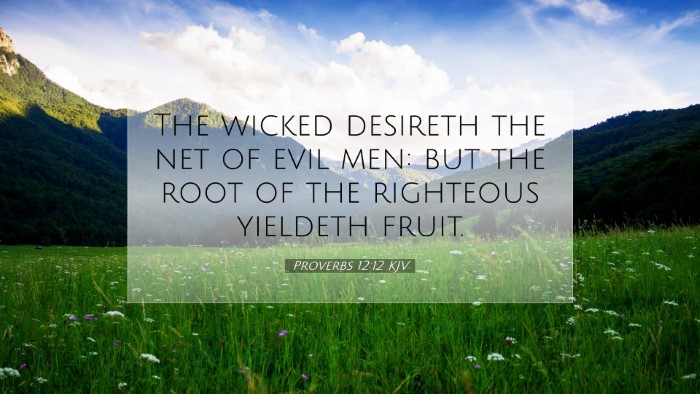Commentary on Proverbs 12:12
Proverbs 12:12 (ESV): "The wicked covet the catch of evil men, but the root of the righteous bears fruit."
Introduction
This verse presents a striking contrast between the wicked and the righteous, employing agricultural imagery to convey profound spiritual principles. Throughout Proverbs, contrasts between righteousness and wickedness illustrate the intrinsic outcomes of one's choices and desires. Here, we delve into the insights provided by respected public domain commentaries to enrich our understanding of this proverbial truth.
The Analysis of the Two Types of People
The verse begins by defining two types of individuals: the wicked and the righteous. The wicked are depicted as coveting the gains of evil men. This covetousness highlights a fundamental characteristic of the wicked — they often desire that which is unearned or obtained through malevolent means.
Commentary Insights:
- Matthew Henry: Henry observes that the wicked’s desire for the catch of evil men reveals their heart’s inclination towards theft and treachery. Their ungodly pursuits lead them to seek after benefits that arise from wrongdoing, thus emphasizing their moral depravity.
- Albert Barnes: Barnes explains that the "catch of evil men" may refer to the corrupt gains amassed through deceit. He notes that while such gains may appear lucrative, they ultimately lead to destruction, echoing the biblical truth that the path of the wicked leads to death.
- Adam Clarke: Clarke comments on the nature of the wicked's desires, suggesting that they are fixated on the transient pleasures offered by sin. Their pursuit is inherently flawed as it lacks a foundation in righteousness, which leads to fruitlessness in the long run.
The Righteous and Their Fruits
In contrast to the wicked, the verse emphasizes "the root of the righteous bears fruit." This metaphorical expression highlights the stability and growth inherent in a righteous life. The 'root' signifies depth, stability, and nourishment, emphasizing that righteousness takes root in the soul and eventually manifests in a fruitful life.
Commentary Insights:
- Matthew Henry: Henry points out that the root metaphor signifies that righteousness is deeply anchored in God. As roots draw nourishment from the soil, so the righteous draw strength and sustenance from their relationship with the Lord, resulting in the visible fruits of divine virtue.
- Albert Barnes: Barnes elaborates on the idea of fruit, indicating that genuine righteousness results in ethical living, good deeds, and a life that reflects God’s character. This fruitfulness is the natural outcome of living a life aligned with God’s commands.
- Adam Clarke: Clarke notes the agricultural perspective, asserting that just as a healthy tree bears fruit, so too do righteous individuals produce good characteristics and works that benefit others and glorify God. He emphasizes the interconnectedness of righteousness and its outward demonstration as fruit.
Applications
From this profound distinction in Proverbs 12:12, several applications can be drawn that are vital for spiritual leaders, theologians, and students of the Scriptures:
1. The Nature of Desires
Reflect upon the nature of desires within your personal and communal life. Are they aligned with God’s standards or tainted by covetousness? A leader’s integrity and purity of heart influence their ministry and the lives of those they shepherd.
2. The Source of Righteousness
Analyze where your righteous roots are situated. Are you grounded in Scripture and reliant upon God's strength? Righteousness is cultivated in conjunction with spiritual disciplines, prayer, and community.
3. The Evidence of Fruitfulness
Evaluate the fruits emerging from your life and ministry. Are they consistent with the character of Christ? It is essential that the outcomes of our lives reflect His goodness, love, and justice.
Conclusion
Proverbs 12:12 serves as a cautionary reminder that one’s pursuits and desires reveal their spiritual condition. The contrast between the wicked’s covetousness and the righteous’s fruitfulness not only outlines moral paths but also serves as an invitation to examine our hearts. In every aspect of ministry and personal discipleship, let us strive to remain rooted in righteousness, producing fruit that honors God and blesses others.


